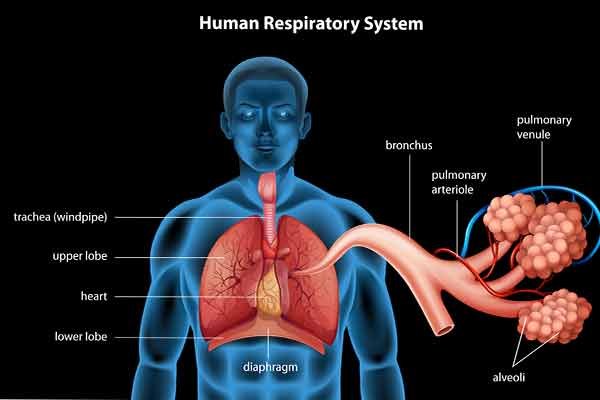Respiratory System
The respiratory system is a complex network of organs and tissues responsible for the process of respiration, which involves taking in oxygen and expelling carbon dioxide. It is a vital system that enables the exchange of gases necessary for sustaining life. In this article, we will delve into the intricacies of the respiratory system, exploring its structure, functions, and the importance of maintaining its health.
The respiratory system plays a vital role in our overall health and well-being. Its structure and functions facilitate the exchange of gases necessary for cellular metabolism and energy production. By maintaining a healthy lifestyle, practicing good respiratory hygiene, and seeking prompt medical attention for respiratory symptoms, we can ensure the longevity and optimal functioning of this essential system.

Structure of the Respiratory System:
The respiratory system consists of several interconnected components, including the airways, lungs, and associated structures:
- Nose and nasal cavity: The nose serves as the main entrance for air, filtering, and moistening it as it passes through the nasal cavity.
- Pharynx: Located at the back of the throat, the pharynx serves as a passage for both air and food.
- Larynx: Also known as the voice box, the larynx houses the vocal cords and aids in speech production.
- Trachea: Commonly referred to as the windpipe, the trachea carries air from the larynx to the lungs.
- Bronchi and bronchioles: The trachea branches into two bronchi, each leading to a lung. These bronchi further divide into smaller bronchioles, which distribute air within the lungs.
- Alveoli: Tiny air sacs at the ends of bronchioles where the exchange of oxygen and carbon dioxide occurs. The alveoli are surrounded by a network of blood vessels called capillaries.
Functions of the Respiratory System:
The respiratory system performs crucial functions necessary for sustaining life:
- Breathing: The primary function of the respiratory system is the exchange of gases during inhalation and exhalation. Inhalation brings oxygen-rich air into the lungs, while exhalation removes carbon dioxide, a waste product of cellular metabolism.
- Gas exchange: Within the alveoli, oxygen from inhaled air diffuses into the bloodstream, while carbon dioxide from the bloodstream diffuses into the alveoli to be expelled during exhalation.
- Oxygenation: Oxygenated blood is carried by the circulatory system to all body tissues, providing the necessary oxygen for cellular metabolism and energy production.
- Regulation of pH: The respiratory system helps maintain the acid-base balance in the body by regulating the levels of carbon dioxide and hydrogen ions.
Maintaining Respiratory Health:
Maintaining a healthy respiratory system is crucial for overall well-being. Here are some key considerations:
- Avoid smoking: Cigarette smoke damages the lungs and increases the risk of respiratory conditions, including chronic obstructive pulmonary disease (COPD) and lung cancer.
- Environmental factors: Minimize exposure to air pollutants, allergens, and irritants such as dust, chemicals, and strong fumes that can harm the respiratory system.
- Regular exercise: Engaging in physical activity helps improve lung capacity and efficiency, promoting overall respiratory health.
- Proper hygiene: Practicing good respiratory hygiene, such as covering the mouth and nose while coughing or sneezing, can prevent the spread of respiratory infections.
- Vaccinations: Stay up to date with vaccinations, including the influenza vaccine and pneumonia vaccine, to protect against respiratory infections.
- Breathing exercises: Techniques such as deep breathing, diaphragmatic breathing, and pursed-lip breathing can help improve lung function and respiratory muscle strength.
- Adequate hydration: Drink sufficient water to maintain proper hydration, which helps keep the respiratory mucous membranes moist and facilitates effective mucus production and clearance.
- Healthy lifestyle: Maintain a balanced diet, manage stress levels, and get enough sleep to support overall respiratory health.
